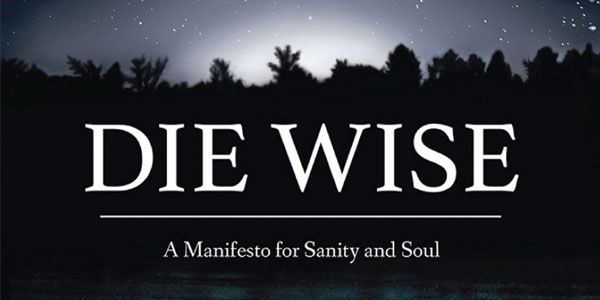
De los muchos libros que he leído a lo largo de los años, ninguno me ha marcado tanto como lo he hecho Stephen Jenkinson, con “Die Wise: A Manifesto for Sanity and Soul”.
Publicado en 2015 por North Atlantic Books, el libro es una penetrante contemplación de la vida – y particularmente la muerte – escrito por Jenkinson, un canadiense que ha trabajado en lo que él llama el “negocio de la muerte” (cuidar de una persona al final de su vida) por más de 20 años.
“Me he sentado con cientos de personas moribundas y sus familias y tuve el complicado privilegio de tratar de ayudarles a morir”, escribe Jenkinson en la introducción de su libro. “Vi que como cultura tenemos una psicología deficiente al hacer frente y aceptar dónde podríamos haber tenido una alegoría y una poesía o una muerte significativa y con propósito”.
Jenkinson, que tiene una maestría en teología de la Universidad de Harvard y una en trabajo social de la Universidad de Toronto, ya no está directamente involucrado en cuidados paliativos. En cambio, comparte sus pensamientos sobre cómo morir – y vivir – sabiamente a través de discursos, libros y por medio de clases en su escuela Orphan Wisdom en Canadá.
“La realidad es que no es tu vida y no es tu muerte”, indicó Jenkinson por teléfono desde su terreno de 60 acres en Canadá, cerca de la frontera Ontario-Quebec. “Son préstamos, – y la única pregunta es qué vas a hacer con ellos en el tiempo en que te son confiados.”
El trabajo de Jenkinson ha sido ser una especie de ángel (“angelos” significa “mensajero” en griego) de noticias que no deberían ser una sorpresa inquietante: la muerte de una persona.
En “Grief Walker”, una película del 2008 que describe la vida de Jenkinson, le preguntan sobre el ser llamado “el ángel de la muerte”. “No me molesta”, responde. -No, no me importa. Yo no lo apoyo mucho. Él continúa diciendo que ser este tipo de ángel significa “ser testigo fiel de lo miserablemente difícil que es en nuestro tiempo y lugar hacer algo que normalmente es decisión de Dios “.
Stephen Jenkinson: The angel of death
Profile and commentary by Nicholas Peterson
Of the many books I’ve read over the years, I have perhaps not marked one up so much as I have Stephen Jenkinson’s “Die Wise: A Manifesto for Sanity and Soul.”
Published in 2015 by North Atlantic Books, the book is a penetrating contemplation of life – and particularly death – by Jenkinson, a Canadian who has worked in what he calls the “death trade” (care at the end of a person’s life) for more than 20 years.
“I have sat with hundreds of dying people and their families and had the burdensome privilege of trying to help them die,” Jenkinson writes in the book’s overture. “I saw that as a culture we have a withered psychology of coping and accepting where we might once have had a mythology and a poetry or purposed, meaningful dying.”
Jenkinson, who holds a master’s degree in theology from Harvard University and one in social work from the University of Toronto, is no longer directly involved in palliative care. Instead, he shares his thoughts on how to die – and live – wisely through speaking engagements, books and by holding classes at his Orphan Wisdom School in Canada.
“The truth of the matter is, it’s not your life and it’s not your death,” Jenkinson said by phone from his 60-acre plot in Canada near the Ontario-Quebec border. “They’re loaners, you see – and the only question is what are you going to do with them in the time that they’re entrusted to you.”
Jenkinson’s job has been to be a kind of angel (“angelos” means “messenger” in Greek) of news that should never come as a disturbing surprise: one’s death.
In “Grief Walker,” a 2008 film profiling Jenkinson’s life, he’s asked about being called “the angel of death.” “I don’t mind it,” he replies. “No, I don’t mind it. I don’t cultivate it too much.” He continues, saying that being this kind of angel means “to be a faithful witness to how wretchedly difficult it is in our time and place to do something that is otherwise God-given.”










